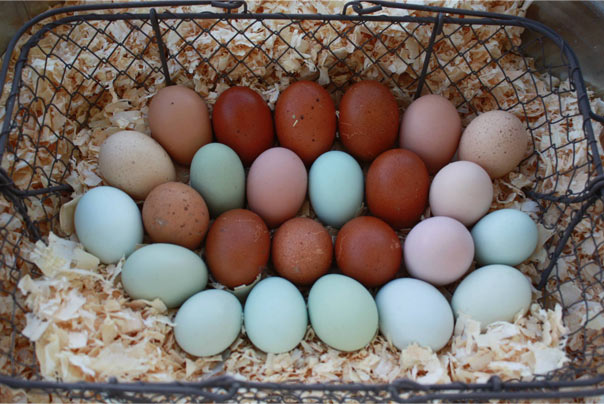
Kaliko Farms’ unique multicolored eggs
To access all the articles in this month's issue of The Organic & Non-GMO Report, SUBSCRIBE NOW.
Eggs over easy, hold the GMOs
Published: April 30, 2015
Category: Non-GMO Company
An egg farmer's journey to Non-GMO Project Verification
By Warren Goldie, senior marketing communications manager, Global ID Group
A native of Hawaii who found her calling as an egg farmer on California’s Central Coast, Kaliko Orian draws a direct connection from Non-GMO Project Verification to the small business success of her company, Kaliko Farms.
“I started noticing the butterfly logo in 2013,” says Ms. Orian. “I knew that if I wanted to be on the cutting edge of what I do, there’d be no better way than to have a certifying body say, ‘Yes, your products are non-GMO.’”
Ms. Orian took possession of 300 organic hens in 2012 when a friend left the farming business. A self-described city girl, Ms. Orian decided to try farming.
In three years, Kaliko Farms has expanded to include several fast-growing farms of free-range hens, as well as a small breeding operation north of Los Angeles. Demand usually exceeds supply for Ms. Orian’s unique multicolored eggs. The shell colors are determined by the breed of hen, which are all pasture raised.
Catching the Butterfly
Ms. Orian’s interest — and business acumen — was piqued initially by her research into the Non-GMO Project, which led her to the website of FoodChain ID, a third-party expert in managing the Non-GMO Project verification process for client companies. Ms. Orian enrolled in the verification program.
Initially she was daunted by the array of requirements necessary for verification, which include document review, scanning of labels, form completion, and working with suppliers to establish their non-GMO status.
Her main point of contact at FoodChain ID was farm specialist Molly Reiff. “We had a relatively short timeline,” recalls Ms. Reiff. “The stores wanted Kaliko’s eggs, and she had a significant outstanding request from a customer who required Non-GMO Verified eggs which was being held up. Fortunately, she was feeding her birds a no-corn, no-soy feed, which reduces GMO risk. That meant we could move faster through verification.”
Also part of FoodChain ID’s services was the use of SupplyTrak, a web-based supply-chain compliance management system that automates Non-GMO Project verification.
That was ideal for Ms. Orian, since the animal-related verification process can be complex, requiring in-depth analyses of feed rations and fine-toothed examination of supplier practices and facilities.
Following up with “those guys”
Next up was the feed mill. Though Ms. Orian uses a non-GMO feed mix produced by a family-run operation in King City, CA, she feared delay when it was discovered that the mill would need to comply with newer, updated Non-GMO Project Standard requirements.
“The last thing the mill wanted was to have to get in touch with their vendors and follow up with those guys,” says Orian. But all went smoothly, the feed complied with requirements, and Ms. Orian’s products earned use of the Non-GMO Project Verified seal.
FoodChain ID completed Kaliko Farms’ verification process in less than a month, enabling Orian to meet the tight deadline for her upcoming contract reliant on her offering Non-GMO Project Verified eggs. In general, the timelines for verification vary, depending on the GMO risk level of the products and ingredients under review.
“Non-GMO Project Verified is a business decision that gets you noticed,” says Ms. Orian. “Anybody who wants to make a difference in the marketplace needs to be non-GMO.”
For more information on becoming Non-GMO Project Verified, contact FoodChain ID at 866-440-3242 or enrollinquiries@foodchainid.com or visit www.foodchain.com.
© Copyright The Organic & Non-GMO Report, May 2015




